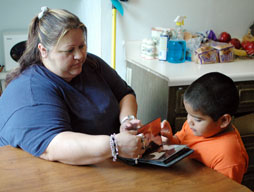By Martina Treviño/nw news editor
(Final in a four-part series on victims’ rights.)

One random act of violence forever changed Maria Mora’s life.
Rodolfo Ortiz, her fiancé, was shot while making a call on a pay phone on Long Avenue in Fort Worth’s Northside. It was very early morning Aug. 6, 2001; no one except the shooter knows why.
“ I was at home waiting for him, and he never got there,” Mora said.
That morning Mora answered the door to find a police detective and a representative from the Victim’s Compensation Office instead of her fiancé.
“ The detective told me what happened, but the minute I saw them, I knew what it was. I knew he was gone,” she said. “The lady [Victim’s Compensation representative] offered to help, and they did.”
“ They paid for the funeral, the casket and bought him a new suit. But after that, I never heard from them again.”
Because Ortiz’s killer has never been found, the District Attorney’s office lost touch with Mora because they follow only cases being prosecuted.
Mora was 30, a mother of six children, five from a previous marriage and Ortiz’s 8-month-old namesake, and alone.
Although she is appreciative of the financial aid the victim’s compensation office gave her, Mora wishes she had received additional emotional support.
“ I lost everything when I lost him. I lost everything I had,” she said. “Everything stopped.”
Although she was struggling, Mora had a steady job and had attained the dream of purchasing her own home. She and Ortiz were making plans for a December wedding.
In a single instant, Ortiz’s death put her life into a downward spiral. Mora lost her job and her house as a consequence.
The loss of her home was devastating, Mora said.
“ I had worked so hard to buy it. I thought my kids would grow up there,” she said.
In addition, although she still owned the family van, she could not drive it.
“ His blood was in it,” she said. “I couldn’t stand to look at it, to be inside it.”
The circumstances forced Mora and her children to move into her mother’s home and depend on her family for transportation.
Although her family and Ortiz’s family helped her out financially by providing clothes and school supplies for the children, Mora said she felt she had no one to sustain her emotionally.
When she lost her job, she also lost her insurance benefits, so she was unable to continue visiting the counselor she had been seeing.
“I could have used some more counseling,” Mora said. “I had no one for emotional support.”
Mora fell into “a really, really, really deep depression. I felt lost, disconnected from everyone and everything.”
She found solace in food.
“ I gained a lot of weight,” she said.
The weight gain brought additional distress in the form of diabetes and high blood pressure, which requires Mora to take medication and insulin injections.
Although the past six years have been extremely difficult for Mora, she now sees a future for herself and for her children.
“ Things are better now,” she said. “We moved out of my mom’s,” she said. “I manage on the survivor’s benefits, and my oldest daughter helps out with the bills.”
Mora attends NW Campus working on completing the core curriculum courses. She plans to apply for the nursing program at El Centro College in Dallas to become a licensed vocational nurse.
She plans to transfer and commute by train to El Centro because the nursing program there can be completed in only one year.
“ I want to be able to work as a nurse as soon as possible,” she said.
Nevertheless, she wants to continue her education after becoming an LVN and become a registered nurse.
Ortiz’s case remains open at the Fort Worth Police Department. A crime stopper’s reward is available for anyone who provides information leading to the arrest and conviction of the person who killed Ortiz.


























